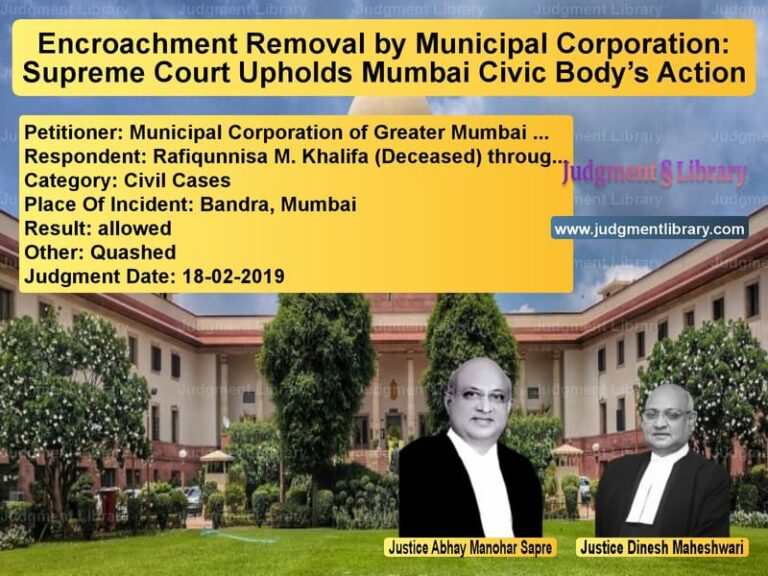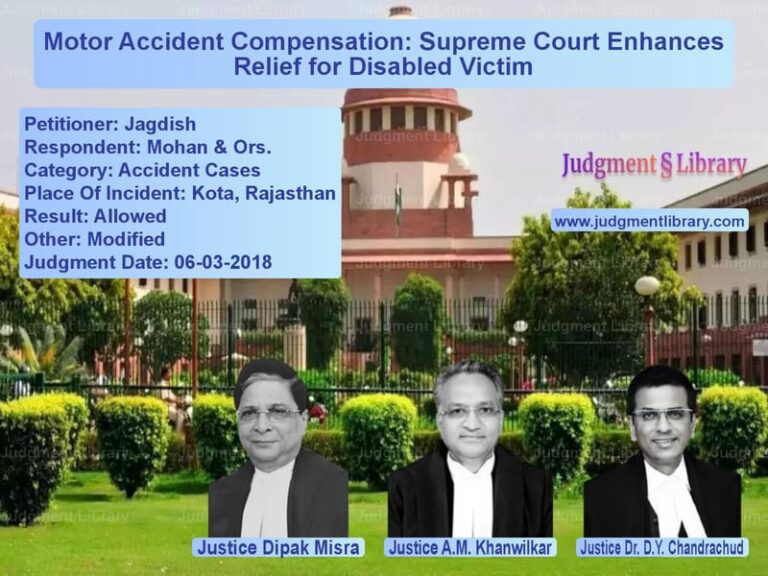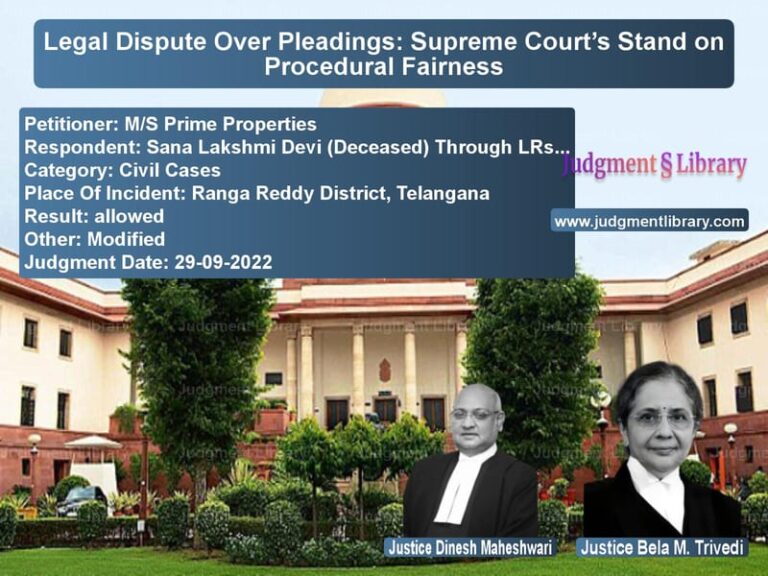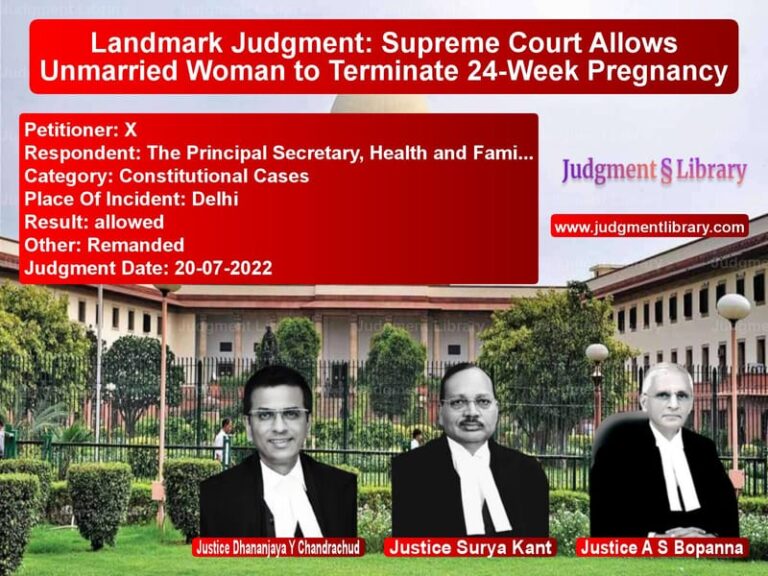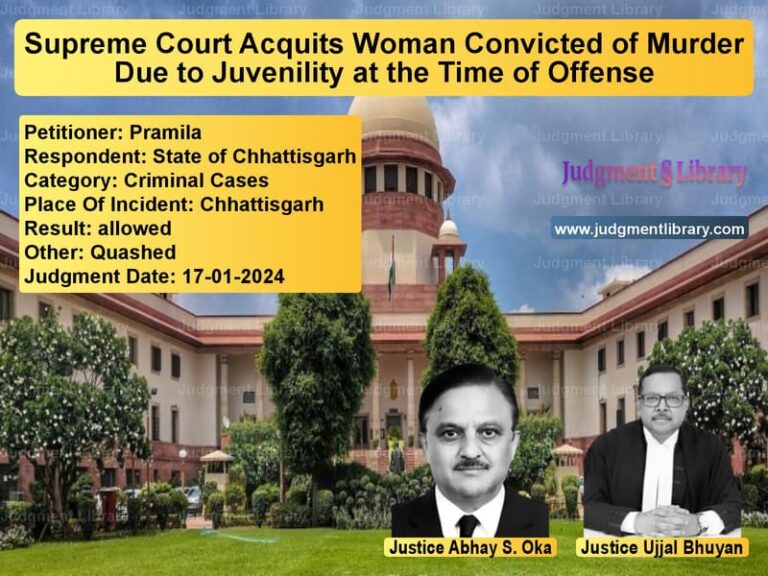Solomon Selvaraj & Others vs. Indirani Bhagawan Singh: Supreme Court Rules on Indigent Persons and Court Fee Payment
The Supreme Court of India, in its judgment dated December 2, 2022, in the case of Solomon Selvaraj & Others vs. Indirani Bhagawan Singh & Others, addressed a crucial legal issue concerning the right of indigent persons to file lawsuits without paying court fees. The case involved an application filed by the appellants under Order 33 Rule 1 of the Code of Civil Procedure (CPC), seeking permission to sue as indigent persons in a suit for declaration of title and recovery of possession. The Supreme Court ruled that while such applications can be rejected on specified legal grounds, the plaintiffs should still be given an opportunity to pay court fees and proceed with their suit.
Background of the Case
The appellants, Solomon Selvaraj and others, filed a suit for declaration of title and recovery of possession. Due to their financial constraints, they submitted an application seeking permission to file the suit as indigent persons under Order 33 Rule 1 of the CPC. However, the defendants opposed the application, arguing that:
- The suit was barred by res judicata.
- There was no valid cause of action.
- The claim of indigency was not genuine.
The trial court rejected the application, and the High Court of Judicature at Madras upheld this decision in its judgment dated January 28, 2022. The appellants then approached the Supreme Court.
Arguments Presented
Petitioners’ (Appellants’) Arguments
The appellants, represented by Senior Counsel Ms. V. Mohana, argued:
- The trial court and the High Court erred in considering the merits of the suit while deciding an application to sue as indigent persons.
- Under Order 33 Rule 5 of the CPC, an application to sue as an indigent person can be rejected only on specific grounds, such as the absence of a cause of action or the suit being barred by law.
- Instead of outright rejecting the application, the courts should have granted the appellants time to pay the court fees and continue with the suit.
Respondents’ (Defendants’) Arguments
The respondents, represented by their counsel, argued:
- The suit was an abuse of the process of law and was barred by res judicata.
- The appellants had the means to pay court fees but were using the plea of indigency to delay proceedings.
- The courts were justified in rejecting the application as the suit was frivolous and did not disclose a valid cause of action.
Supreme Court’s Observations
The Supreme Court reviewed the provisions of Order 33 of the CPC, which governs suits filed by indigent persons. The Court made the following key observations:
- “In an application permitting the plaintiffs to sue as indigent persons, it is not open for the learned trial court or the High Court to opine on the merits of the suit, whether the plaintiff is likely to succeed, or whether the suit is barred by res judicata.”
- “If the application is granted, the suit shall proceed without the plaintiffs having to pay court fees. If rejected, the plaintiffs should be given the opportunity to pay the requisite court fees and continue the suit.”
- “The appellants have stated at the Bar that they are ready to pay the court fees treating their application to sue as indigent persons dismissed.”
Legal Provisions Discussed
The Supreme Court analyzed the relevant provisions of Order 33 of the CPC:
- Order 33 Rule 5: Lists grounds for rejecting an application to sue as an indigent person, including lack of cause of action and the suit being barred by law.
- Order 33 Rule 15: States that rejection of an application to sue as an indigent person does not prevent the plaintiff from filing the suit in the ordinary manner.
- Order 33 Rule 15A: Grants the court discretion to allow plaintiffs time to pay court fees if their application to sue as indigent persons is rejected.
Judgment and Ruling
The Supreme Court ruled in favor of the appellants with the following key directions:
- The rejection of an application to sue as an indigent person does not mean the suit itself is barred.
- The appellants were granted four weeks to pay the requisite court fees, failing which the suit would be dismissed.
- Any observations made by the lower courts on res judicata or cause of action would not affect future proceedings.
- The respondents were given the right to file an application under Order 7 Rule 11 of the CPC to challenge the maintainability of the suit.
Implications of the Judgment
This ruling provides clarity on how courts should handle applications filed by indigent persons. The key takeaways are:
- Courts should not assess the merits of a suit while deciding an application under Order 33 Rule 1 of the CPC.
- Rejection of such an application does not prevent the plaintiffs from proceeding with the suit by paying court fees.
- The ruling protects the rights of financially disadvantaged litigants while ensuring that frivolous claims do not abuse the process of law.
Conclusion
The Supreme Court’s decision in Solomon Selvaraj & Others vs. Indirani Bhagawan Singh & Others ensures that indigent persons are given a fair opportunity to seek justice. By clarifying the legal position, the Court has reinforced the principle that procedural barriers should not prevent genuine litigants from accessing the judicial system. This ruling serves as an essential precedent for future cases involving indigent litigants and court fee payment.
Petitioner Name: Solomon Selvaraj & Others.Respondent Name: Indirani Bhagawan Singh & Others.Judgment By: Justice M.R. Shah, Justice M.M. Sundresh.Place Of Incident: Madras.Judgment Date: 02-12-2022.
Don’t miss out on the full details! Download the complete judgment in PDF format below and gain valuable insights instantly!
Download Judgment: solomon-selvaraj-&-o-vs-indirani-bhagawan-si-supreme-court-of-india-judgment-dated-02-12-2022.pdf
Directly Download Judgment: Directly download this Judgment
See all petitions in Property Disputes
See all petitions in Specific Performance
See all petitions in Judgment by Mukeshkumar Rasikbhai Shah
See all petitions in Judgment by M.M. Sundresh
See all petitions in partially allowed
See all petitions in Modified
See all petitions in supreme court of India judgments December 2022
See all petitions in 2022 judgments
See all posts in Civil Cases Category
See all allowed petitions in Civil Cases Category
See all Dismissed petitions in Civil Cases Category
See all partially allowed petitions in Civil Cases Category


